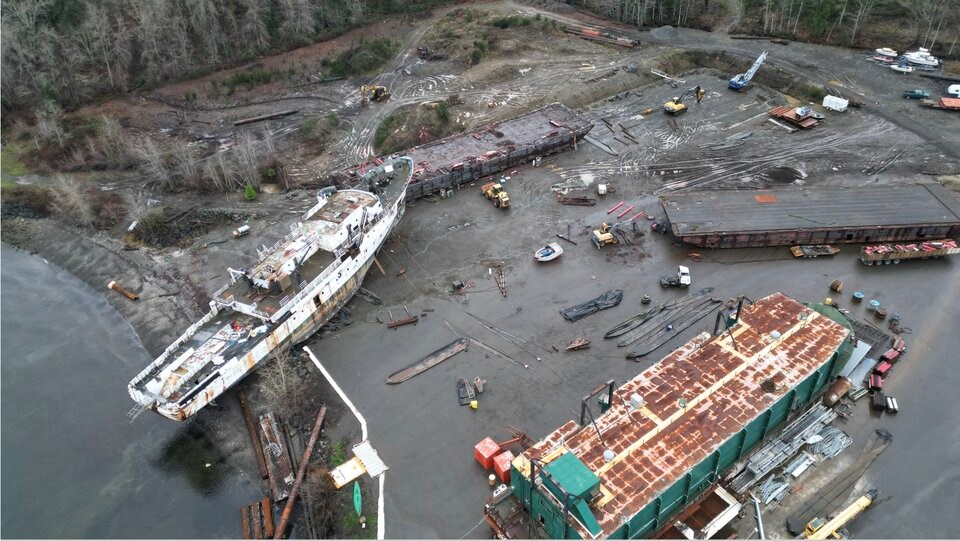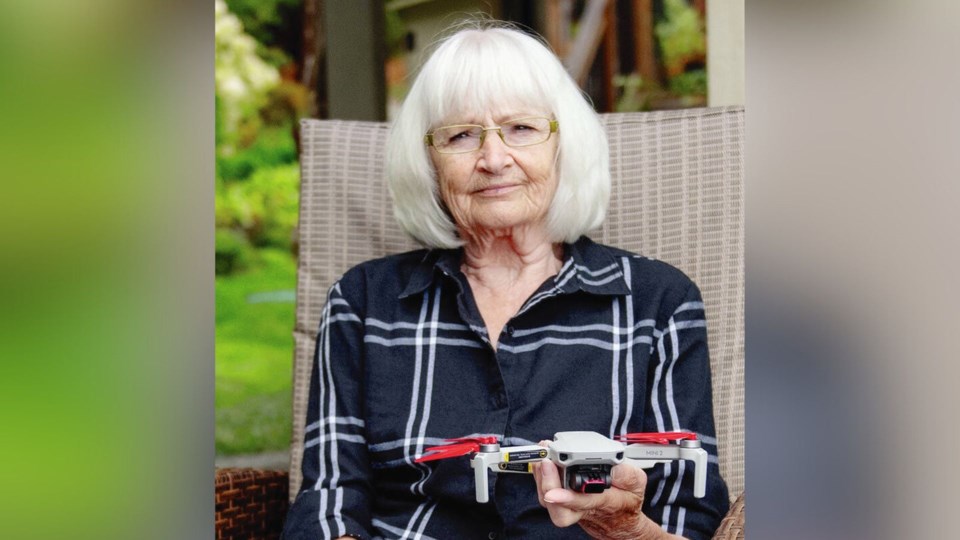A leading critic of a company that dismantles and recycles ships on a stretch of Vancouver Island shoreline has been awarded more than $165,000 by the B.C. Supreme Court after a judge determined the company had unduly delayed litigation.
Deep Water Recovery's 111-acre beachfront facility at Union Bay receives ships and barges from across B.C. and overseas. When a vessel arrives, workers cut it into smaller sections with shears and torches.
The leftover materials — which include wood debris, steel, rusted metal, septic system discharge and other effluents — are then divided up for disposal and recycling, according to provincial inspection reports.
The Union Bay operation has been the target of significant local opposition since they began breaking apart barges in 2020. A year later, as BC Ferries moored the retired Queen of Burnaby at Union Bay in preparation for recycling, the K'ómoks First Nation took a public stand opposing the ship-dismantling facility. And in 2022, the Comox Valley Regional District filed a yet unresolved civil suit against the company on grounds the site was not zoned for ship deconstruction.
Earlier this year, the company was penalized $46,105 for releasing effluent laced with high concentrations of toxic metals into the ocean at least seven times between 2023 and 2024. The toxic waste was found to contain elevated levels of copper, zinc and lead, that at the high end, exceeded provincial water quality guidelines by nearly 24,000 per cent.
Local opposition to Deep Water’s operations has been partially headed by Mary Reynolds, a Union Bay woman who has spent the last few years monitoring the industrial ship-breaking operation with a drone.
On June 20, 2022, Reynolds filed a notice of civil claim against Deep Water Recovery for “harassment, assault and intimidation” following altercations with Mark Jurisich, the company’s director, operations manager and majority shareholder.
Reynolds alleged the man, as well as other company staff, had approached her in a parking lot, physically intimidated her, stole her drone, followed the woman to her house, and threatened her.
Reynolds sought general, special, aggravated and punitive damages, and a court order preventing the man and other employees from coming within 100 feet of her home.
About three weeks later, the company and Jurisich filed a response to the lawsuit and a counterclaim in B.C. Supreme Court — court action Justice Gareth Morley described in an April 2024 ruling as a “tit for tat.”
Deep Water claimed Reynolds worked with others to engage in a “malicious campaign” against the company — one driven by “conduct that is wrongful, high-handed, and deserving of rebuke,” the company submitted.
Morley found Deep Water's counterclaim was motivated by a number of events, including Reynolds’s use of a drone to surveil the company’s operations and distribute the images; her apparent role as a critic of the company; and her decision to sue the company and Jurisich.
Deep Water sought court declarations that Reynolds’s acts represented trespass, should be considered a “nuisance” and were in violation of the company’s property rights.
“On its face, the counterclaim asks for compensation for business losses from publication of footage of its operations as part of damages under the Privacy Act,” wrote Morley.

Reynolds had sought to strike the counterclaim, alleging it attempted to silence expression on matters of public interest and should be dismissed under B.C.’s Protection of Public Participation Act (PPPA). The anti-SLAPP law was created to counter strategic litigation against public participation.
The act is meant to discourage SLAPP suits and gives a judge power to award legal costs to a defendant. Court precedent has established that application of the anti-SLAPP law often hinges on four signals. They include:
- does the plaintiff have a history of using litigation or the threat of litigation to silence critics?
- is there a financial or power imbalance that strongly favours the plaintiff?
- was the legal action animated by a punitive or retributive purpose?
- and has the plaintiff suffered or is likely to suffer only minimal or nominal damages as a result of the defendant’s conduct?
In his April 2024 decision, Morley found the portion of Deep Water’s counterclaim that targeted the dissemination of the videos and images should be dismissed under the anti-SLAPP law.
In explaining why he was not dismissing DWR’s counterclaim in its entirety, Morley pointed to comments made by Reynolds’s lawyer Jason Gratl.
As Gratl put it in testimony: the “law of what people are allowed to do with their drones in the vicinity of other people’s property is undeveloped and the counterclaim raises reasonable issues in this regard.”
While he allowed questions of trespass and surveillance to be heard, in a Sept. 20, 2024, decision, Morley found Deep Water had unduly delayed litigation.
“This application took a very long time to get heard, and much of this was due to Deep Water Recovery’s litigation choices,” stated Morley.
“I would say that this has been a complex and indeed unnecessarily complex path to getting to resolution … and Deep Water Recovery may need to bear the consequences of this litigation approach.”
The judge ordered the company to pay two-thirds of Reynolds's legal costs for the anti-SLAPP application.
The full dollar amount of those costs were left to B.C. Supreme Court Registrar Meg Gaily. In her July 25, 2025, decision, Gaily wrote that the legal costs claimed by Reynolds were reasonable and in line with similar court cases.
She pointed to Gratl’s hourly rate of $575 and a second lawyer’s rate of $325 per hour. Paralegal work at the law firm Gratl and Company was billed at $125 per hour. All of those costs were stretched out over proceedings that lasted nearly two years, with over a week of court time.
“Based on the evidence before me, I find that the PPPA application proceedings were complex and raised novel issues,” wrote Gaily, “and I find this is a factor weighing in favour of the costs claimed by Ms. Reynolds.”
Reynolds won the full $165,107.53 she sought in legal costs.

.png;w=120;h=80;mode=crop)

